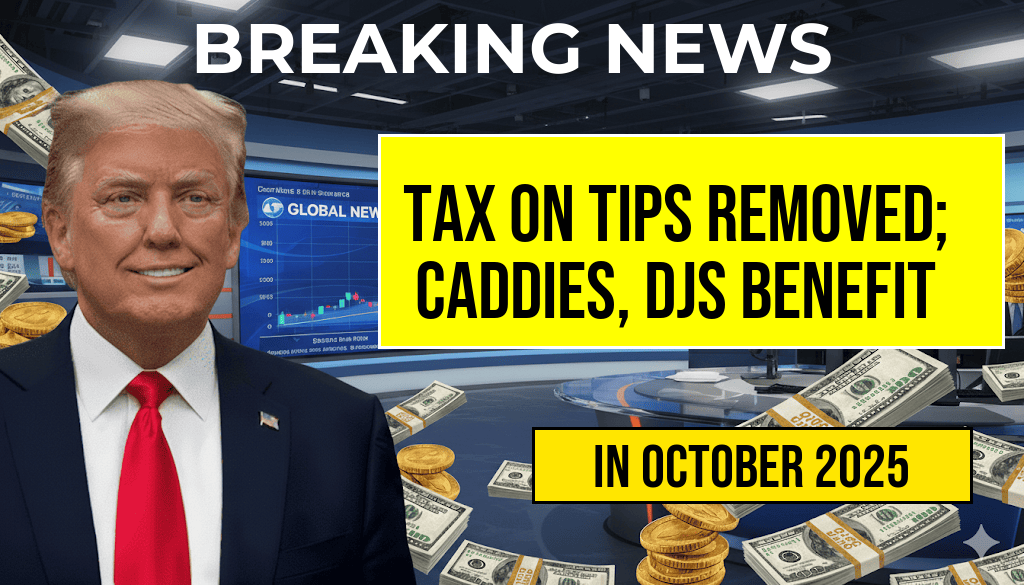The recent legislative changes have brought significant relief to many American workers and service providers by eliminating the federal tip tax. Historically, tipped workers—such as waitstaff, bartenders, and other service industry employees—were subject to income tax on their tips, which could sometimes lead to complex reporting requirements and financial strain. Now, a new provision effectively removes the federal tip reporting requirement for tips under a specified threshold, potentially opening the door for an expanded tax deduction of up to $25,000. This change is especially noteworthy because it could extend beyond traditional service roles to include roles like golf caddies and DJs, who often depend heavily on tips. The move aims to streamline tax compliance, reduce burdens on low- and middle-income workers, and recognize the evolving nature of service-based income. While the legislative details are still being clarified, industry insiders and tax experts are already examining the potential ramifications for a broader range of tip earners.
Legislative Shift Eases Tax Burden on Tipped Workers
The new rules, part of a broader tax reform package passed by Congress, eliminate the federal tip inclusion requirement for tips earned below a certain threshold—initially set at $20 but now increased to $25,000 in some contexts. This change means that workers earning tips under this amount will no longer need to report or pay taxes on those tips, simplifying payroll processes and reducing compliance costs. The update was motivated by concerns over the complexity and fairness of taxing small tip amounts, which often comprise a significant part of workers’ income but are difficult to track accurately.
Implications for Service Industry Workers
- Reduced administrative burden for restaurants, bars, and similar establishments
- Increased disposable income for low- and middle-income workers
- Potential for broader tax deductions related to tips and service charges
Tax experts suggest that this adjustment could also encourage better compliance among workers who previously hesitated to report tips for fear of audits or penalties. The measure aims to formalize the tipping economy, making it more transparent and equitable. The Wikipedia article on gratuity highlights how tips have historically been a vital component of service workers’ earnings, often constituting a significant portion of their income.
Potential Expansion to Non-Traditional Tipped Roles
One of the most intriguing aspects of the recent legislative change is the possibility that it could extend tax benefits and deductions to roles traditionally not associated with tipping, such as golf caddies and DJs. These roles have seen a rise in tip-based compensation, especially in luxury or entertainment settings, prompting questions about their inclusion under new rules.
Understanding the Broader Tax Deduction Possibility
The legislation hints at a potential $25,000 deduction for tip-related expenses, which could be particularly advantageous for individuals who rely heavily on tips for income. For instance, a golf caddie working at upscale courses might receive substantial tips, and the ability to deduct associated expenses could significantly lower their taxable income. Similarly, DJs performing at private events or clubs often depend on tips, and the new rules might enable them to claim deductions more easily.
| Role | Typical Tip Income | Potential Deduction | Impact |
|---|---|---|---|
| Restaurant Server | $15,000/year | Up to $25,000 (if applicable) | Reduces taxable income and simplifies reporting |
| Golf Caddie | $10,000/year in tips | Potentially eligible for deductions under new rules | May lower tax liability significantly |
| DJ | $12,000/year | Possible inclusion in the $25,000 limit | Enhances earnings and reduces tax burden |
Legal and Practical Considerations
While the legislation offers promising avenues for tax relief, experts caution that the actual application may depend on specific circumstances and the interpretation of IRS guidelines. For example, the definition of what constitutes a tip versus a service fee or other form of compensation could influence eligibility. Additionally, certain states might implement their own rules that either align with or diverge from federal policies.
Industry Response and Future Outlook
Industry associations representing restaurant owners, hospitality workers, and entertainment professionals have expressed cautious optimism. They welcome the simplification of tax rules but urge clarity to prevent misinterpretation. “This change could significantly ease the burden on workers who rely on tips, but we need clear guidance to ensure compliance,” said a spokesperson for the National Restaurant Association. Meanwhile, tax professionals are advising clients to stay informed about upcoming IRS updates as they interpret the new legislation.
As the details unfold, the broader conversation centers on how to balance fair taxation with practical realities of modern service work. With potential benefits extending into less traditional tip-earning roles, the policy could reshape how service-based income is reported and taxed across multiple industries.
For more information on tax regulations related to tips, visit the IRS official guidance.
Frequently Asked Questions
Will the tax on tips be permanently eliminated for all workers?
No, the recent changes eliminate the tax on tips for qualifying workers, potentially extending to golf caddies and DJs. However, specific eligibility criteria may apply, and it’s important to stay updated with IRS guidelines.
What is the significance of the $25,000 deduction mentioned in the article?
The $25,000 deduction potentially allows qualifying workers to reduce their taxable income, providing significant tax relief. This deduction could benefit those with substantial tip income, including golf caddies and DJs.
Who qualifies for the extended tip-related benefits under the new rules?
Qualifying workers such as golf caddies and DJs who earn substantial tips and meet specific income and employment criteria may qualify for the tax elimination and deduction extensions.
How does the elimination of tax on tips impact employers?
The elimination simplifies tax reporting for employers and may reduce administrative burdens related to tip taxation. However, employers should verify compliance with new regulations and ensure proper documentation.
When do these tax changes take effect, and how can workers benefit?
The tax relief measures are effective immediately or from the start of the upcoming tax year. Workers should consult with a tax professional to maximize benefits related to the $25,000 deduction and tip tax elimination.






